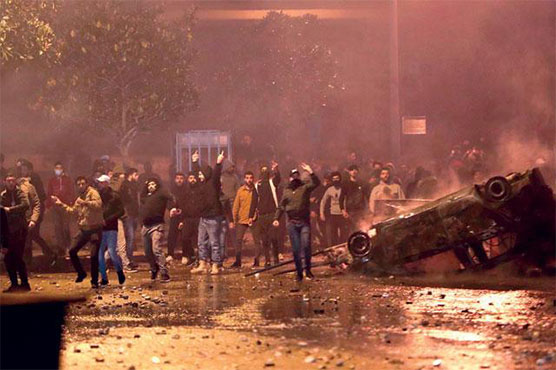Dozens wounded as Shiite parties clash with Lebanese police

The security forces said 25 of its members were wounded and three people arrested.
BEIRUT (AFP) - Dozens of people were wounded in overnight clashes between security forces and supporters of Lebanon s two main Shiite political parties, the civil defence said on Tuesday.
It was the latest incident of violence in what have been largely peaceful protests since October 17 against a political class deemed inept and corrupt.
The street movement pushed the prime minister to step down on October 29, but the country s bitterly divided political parties have failed to agree on a successor.
Shortly before midnight on Monday, young supporters of Shiite political parties Hezbollah and Amal tried to attack the main anti-government protest camp in central Beirut, an AFP photographer reported.
The young men arrived on foot and scooters, apparently fired up by a video of a Lebanese man living abroad in which he insults the sacred symbols of Shiites.
They lobbed stones and fireworks toward the anti-riot police trying to prevent them from entering the largely empty main square.
The counterdemonstrators also torched several cars. The security forces responded with teargas and a water cannon.
Civil defence said 23 people were taken to hospital, while 43 were treated at the scene. It was not immediately clear from which side the wounded were.
The security forces said 25 of its members were wounded and three people arrested.
In the southern city of Sidon, young demonstrators also attacked a protest camp during the night, destroying several tents, an AFP correspondent reported.
On Tuesday, caretaker prime minister Saad Hariri met with the head of the Amal movement, parliament speaker Nabih Berri.
They denounced the video and called on Lebanese to show "vigilance" and not to be "drawn into strife".
Young Hezbollah and Amal supporters have attacked anti-government demonstrators on several occasions over the past two months, mostly angered by what they viewed as insults to their leaders.
Hezbollah is the only group not to have disarmed after the end of Lebanon s 1975-1990 civil war, but also holds seats in parliament and the outgoing government.
Lebanese academic Imad Salamey said the Monday night clashes could have been an attempt to undermine the protests.
"Stirring sectarian strife is one of the ways used by those in power to divide Lebanese and weaken the street movement," he said.
But "I don t think it will work this time," added the professor at the Lebanese American University.
Lebanon s economy is sliding towards collapse, after years of political deadlock compounded by the outbreak of civil war in neighbouring Syria in 2011.
The World Bank projects it will contract by more than 0.2 percent this year.
It has warned that poverty could shoot up from a third to half the population if the latest political crisis is not resolved.
Salamey said solidarity between Lebanese has only increased "after people started losing their jobs and companies and being unable to withdraw money from the banks".
"The economic crisis has broken the barrier of fear, or at least the barriers between different religious sects," he said.
The international community has urged Lebanon to speed up the formation of a new government to implement economic reforms necessary to unlock billions of dollars in foreign aid.
Hariri stepped down under street pressure less than two weeks into the protests.
But no consensus has yet been reached on a replacement and parliamentary consultations to name a new prime minister have twice been postponed, the latest on Monday.
The two-month-old protest movement has been mostly peaceful -- with the exception of some unprecedented clashes between anti-government demonstrators and security forces at the weekend.
On Tuesday, workers set up a steel barricade to cut off the street leading to parliament at the crossroads where protesters have gathered in recent days.

